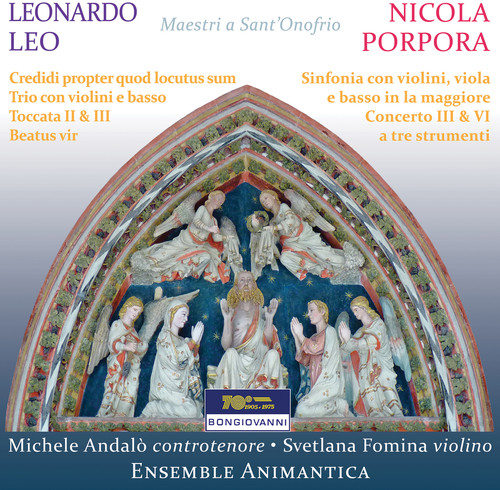Show results for
Deals
- 4K Ultra HD Sale
- Action Sale
- Alternative Rock Sale
- Anime sale
- Award Winners Sale
- Bear Family Sale
- Blu ray Sale
- Blues on Sale
- British Sale
- Classical Music Sale
- Comedy Music Sale
- Comedy Sale
- Country Sale
- Criterion Sale
- Electronic Music sale
- Fantasy Film and TV
- Folk Music Sale
- Hard Rock and Metal Sale
- Horror Sci fi Sale
- Jazz Sale
- Kids and Family Music sale
- Kids and Family Sale
- Metal Sale
- Music Video Sale
- Musicals on Sale
- Mystery Sale
- Naxos Label Sale
- Page to Screen Sale
- Paramount Sale
- Pop and Power Pop
- Rap and Hip Hop Sale
- Reggae Sale
- Rock and Pop Sale
- Rock Legends
- Soul Music Sale
- TV Sale
- TV Sale
- Vinyl on Sale
- War Films and Westerns on Sale

Maestri a Sant'onofrio
- Format: CD
- Release Date: 5/3/2019

Maestri a Sant'onofrio
- Format: CD
- Release Date: 5/3/2019
- Label: Bongiovanni
- UPC: 8007068520329
- Item #: 2158857X
- Genre: Classical
- Release Date: 5/3/2019

Product Notes
The College of Music of Sant'Onofrio, one of the wonders of baroque Naples, was founded in the late 1500s as a foundling institution to train orphans and abandoned children to work as artisans. Within a few years, it's educational policy had shifted to musical training and singing and during the 1600s it was home to the finest composers in the city. They transformed the rigidly austere musical geometry of northern Europe into something wholly new, as though infusing the darkness of the north with the immense, intensely bright light of the south. Nicola Porpora was just such a composer. In 1710 the 24 year-old Porpora presented his opera Berenice in Rome with great success. While in the city, Haendel himself saw it and went to congratulate it's composer. Porpora wrote a great deal of music for religious purposes and opened a singing school which Farinelli also attended. Leonardo Leo is the other great composer from Sant'Onofrio. Almost a decade younger than Porpora, a combination of overwork and delicate health killed Leo at the relatively young age of fifty. He had already produced a number of new operas by 1738 when his reputation for music earned him the commission of a lifetime to write an opera to celebrate the wedding of Charles III and Maria Amalia of Saxony. Leo put everything else to one side and took as his subject the wedding of Psyche and Cupid. Yet despite the success of his opera for the imperial wedding, Leo continued to write music - both sacred and opera, whether serious or comic. Unsurprisingly, his name was a household word throughout Europe.

